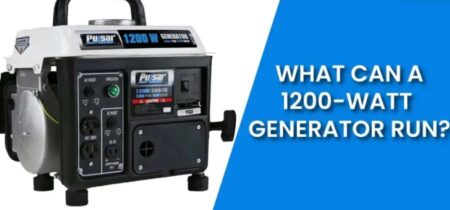
In today’s fast-paced, technology-driven world, electric generators are crucial in ensuring that our daily activities run smoothly and efficiently. From providing backup power during outages to powering remote locations or large-scale events, electric generators offer a reliable source of electricity when needed most.
As we increasingly rely on electronic devices and machinery in our homes, businesses, and industries, a dependable power source has become more essential than ever.
Electric generators contribute to our comfort and convenience and play a vital role in supporting critical infrastructure, such as hospitals, emergency services, and communication networks. Electric generators help maintain the stability and continuity of our modern way of life, highlighting their importance in the ever-evolving landscape of technology and energy. But how does an electric generator work? Let’s find out!
How Does an Electric Generator Work?
An electric generator works with the operation of these three key parts.
Engine:
The engine serves as the generator’s driving force, operating on fuel sources such as gasoline, diesel, or natural gas. The engine powers the rotation of the rotor, which is vital for generating electricity.
Rotor:
The rotor contains magnets and is set in motion by the engine. It rotates at high speeds, producing a magnetic field encompassing the stationary stator. The rotor’s spinning is essential for initiating the process of electromagnetic induction within the stator.
Stator:
The stator is responsible for the process of electromagnetic induction. It comprises copper coils or windings that surround an iron core. An electrical current is induced within these coils when exposed to the rotor’s magnetic field. This process results in the generation of AC electricity, which is essential for powering various electrical devices.
Types of Generators
All generators work on the same function, but the different types can help you decide which is designed to light up your house.
Portable Generators:
As the name suggests, portable generators are designed for mobility and ease of transportation. They often provide temporary power solutions in outdoor events, recreational activities, or emergencies when the main power source is unavailable. In these generators, the engine, rotor, and stator work together to produce electricity as the engine powers the rotor, which then induces a current through electromagnetic induction.
Standby Generators:
Standby generators are permanently installed at homes or businesses to ensure a continuous power supply during power outages. These generators automatically start when the main power supply is disrupted and run on natural gas or propane. In standby generators, the engine, rotor, and stator components work together similarly to portable generators to produce electricity through electromagnetic induction. However, these generators are more robust and designed to handle larger power loads for extended periods.
Inverter Generators:
Inverter generators are a modern innovation combining traditional portable generators’ portability with advanced technology to deliver cleaner and more stable power. These generators produce electricity using the same engine, rotor, and stator components as other generators, but they also incorporate a digital inverter to convert the raw AC power into high-quality AC power suitable for sensitive electronic devices. This advanced technology makes inverter generators more fuel-efficient and quieter than traditional portable generators.
Type of Generator Fuels
An important aspect to consider when understanding how electric generators work is the type of fuel they use. Different fuels have varying advantages and drawbacks, affecting the generator’s efficiency, cost, and environmental impact.
- Gasoline: Gasoline is a popular choice for portable generators due to its widespread availability and relatively low cost. However, gasoline generators typically have shorter runtimes and higher emissions than other fuel types. Moreover, gasoline has a shorter shelf life, which may require more frequent fuel replacement if used sparingly.
- Diesel: Diesel generators are known for their durability, fuel efficiency, and ability to provide more power per gallon of fuel than gasoline generators. They are often used in industrial applications and larger standby generators. However, diesel fuel is generally more expensive and produces higher emissions than other fuel types.
- Propane: Propane-powered generators offer a cleaner and more environmentally friendly option than gasoline and diesel generators. They produce fewer emissions and have a longer shelf life, making them an attractive choice for residential standby generators. However, propane generators usually have lower fuel efficiency and may require more frequent refueling.
- Natural Gas: Natural gas generators are commonly used in residential and commercial standby generators due to their low emissions and ease of use. As natural gas is supplied through a utility pipeline, there is no need for on-site fuel storage or frequent refueling. Natural gas generators are usually more expensive upfront but offer lower long-term operating costs.
Factors that Affect Generator Output
When understanding how an electric generator works, it’s important to be familiar with the factors influencing its output. The amount of electricity a generator can produce depends on several key components, which we will discuss in this section.
Engine size and power:
The engine is the primary source of mechanical energy that drives the generator. A larger, more powerful engine can provide more energy to the rotor, resulting in greater electrical output. However, larger engines may consume more fuel and generate higher emissions, so finding a balance between power and efficiency is essential.
Number of coils in the stator:
The stator, which contains copper coils or windings, plays a crucial role in the electromagnetic induction process. A higher number of coils in the stator can increase the generator’s electrical output by producing more current when the rotor’s magnetic field interacts with the coils. However, a higher number of coils may also result in increased complexity, weight, and cost.
Rotor speed:
The speed at which the rotor spins directly affects the generator’s output. As the rotor spins faster, the magnetic field it creates becomes stronger, inducing more current in the stator coils. Most generators are designed to operate at a specific rated speed (typically 3,600 RPM in North America and 3,000 RPM in Europe) to ensure a stable frequency of the AC power produced. Maintaining the correct rotor speed is essential for delivering consistent and reliable power to the load.
How to Maintain an Electric Generator?
Proper maintenance is needed for an electric generator’s efficient and reliable operation. Neglecting to maintain your generator can lead to decreased efficiency, reduced lifespan, and even failure of the machine. Regular maintenance ensures that your generator remains in good working order, prevents unexpected breakdowns, and helps you get the most out of your investment. Here are ways you can keep your generator up and living:
Common maintenance tasks:
There are several routine tasks that should be performed to keep your generator in optimal condition, such as fuel system inspection, cooling system inspection, and battery maintenance. These tasks may vary depending on the specific model and manufacturer, so it’s essential to consult your generator’s manual for detailed maintenance guidelines. Some common maintenance tasks include:
Oil changes:
Regular oil changes help keep the engine lubricated and running smoothly. Your oil should be changed after a specific number of operating hours or at least once a year, depending on the manufacturer’s recommendations.
Air filter replacement:
Clean air filters ensure that the engine receives an adequate supply of clean air, which is vital for efficient combustion. Over time, air filters can become clogged with debris, reducing engine performance. Replacing the air filter according to the manufacturer’s guidelines will help maintain optimal engine operation.
Spark plug replacement:
Spark plugs are responsible for igniting the fuel-air mixture in the engine’s combustion chamber. Worn or damaged spark plugs can reduce engine efficiency and cause poor performance. It’s important to replace spark plugs periodically as specified by the manufacturer to ensure consistent and reliable ignition.
Common Maintenance Tasks to Keep Your Generator Running
There are several routine tasks that should be performed to keep your generator in optimal condition. These tasks may vary depending on the specific model and manufacturer, but some examples of common maintenance tasks include:
Fuel system inspection:
Inspect the fuel system for leaks, damage, or loose connections. This helps prevent fuel-related issues and ensures the efficient operation of the generator.
Battery maintenance:
Check the battery daily for proper charge levels and clean the terminals to ensure a strong connection. A well-maintained battery is crucial for reliable generator starting and operation.
Cooling system inspection:
Regularly check the coolant level in the radiator and ensure that the cooling system is free from obstructions or leaks. A properly functioning cooling system helps prevent overheating and prolongs the life of the generator’s engine.
Belt inspection and replacement:
Inspect the belts for signs of wear, cracking, or looseness, and replace them as needed. Belts are crucial for the proper operation of various components in the generator, such as the alternator and water pump.
Lubrication of moving parts:
Lubricate moving parts, such as hinges, latches, and bearings, to ensure smooth operation and reduce wear every 250 hours or one month.
Exhaust system inspection:
Examine the exhaust system regularly for leaks, damage, or corrosion. A properly functioning exhaust system is important to keep the operations of the generator safe, as it helps to remove harmful gases produced during combustion.
Safety Measures
When operating an electric generator, it is crucial to prioritize safety to prevent accidents and damage to your property. Here are some key safety considerations to keep in mind:
Proper ventilation and placement:
Generators produce exhaust gases that contain carbon monoxide, which is a dangerous and potentially lethal gas. To avoid the risk of carbon monoxide poisoning, always ensure that your generator is placed outdoors, away from windows, doors, and vents. Additionally, make sure there is adequate ventilation and air circulation around the generator to prevent overheating.
Fuel storage and handling:
Proper fuel storage and handling are essential to minimize the risk of fire, spills, and environmental contamination. Store fuel in approved containers, away from heat sources and open flames, and in a well-ventilated area. When refueling the generator, allow it to cool down first to reduce the risk of a fire caused by spilled fuel coming into contact with hot engine components.
Regular maintenance and inspections:
Performing regular maintenance and inspections on your generator helps to ensure its safe and efficient operation. Check for any signs of wear or damage and address any issues promptly. You need to check the safety devices almost daily, such as circuit breakers and grounding connections, to make sure they are functioning correctly.
By following these safety considerations and the guidelines provided by the generator’s manufacturer, you can reduce the risk of accidents and ensure that your electric generator works effectively and safely when you need it most.
How does an Electric Generator Work Conclusion
We hope this easy-to-understand guide has helped you learn about how electric generators work, the different types, fuel options, maintenance needs, and safety tips. Knowing how an electric generator works is important when choosing and taking care of a generator that fits your specific needs. Now that you have this knowledge feel free to explore various generator options and think about which type is best for your home, business, or industrial use. Keep in mind that regular maintenance and following safety guidelines are essential for your electric generator to work well and safely over time.
Also Read:
Difference between Inverter and Generator | 2023 Guide
How Much Gas Does A Generator Use | 2023 Guide








